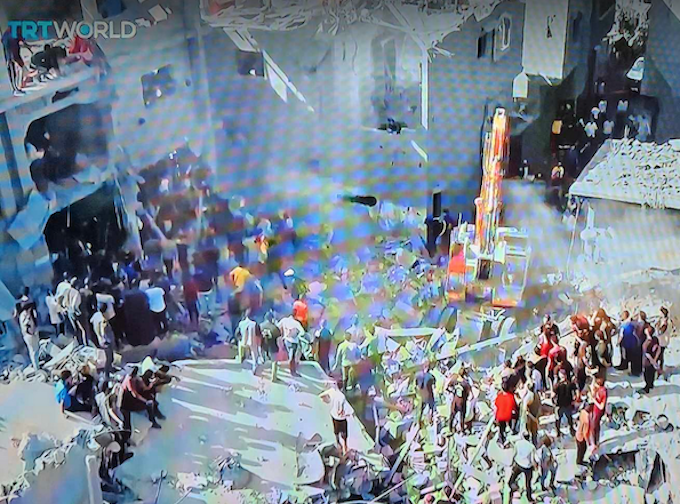
REVIEW: By David Robie
Just months before the outbreak of the genocidal Israeli war on Gaza after the deadly assault on southern Israel by Hamas resistance fighters, Australian investigative journalist and researcher Antony Loewenstein published an extraordinarily timely book, The Palestine Laboratory.
In it he warned that a worst-case scenario — “long feared but never realised, is ethnic cleansing against occupied Palestinians or population transfer, forcible expulsion under the guise of national security”.
Or the claimed fig leaf of “self defence”, the obscene justification offered by beleaguered Israeli Prime Minister Benjamin Netanyahu for his two-month war of vengeance, death and destruction unleashed upon the people of Palestine, both in the Gaza Strip and the Occupied West Bank that has killed at least 14,850 Gazans — the majority of them women and children — and more than 218 West Bank Palestinians.
- READ MORE: ‘Can’t believe I’m out’: First Palestinians released from Israeli prisons
- Israel-Hamas war live: PM says 12 Thai captives released amid Gaza truce
- Prisoners, captives set to be released after Gaza truce takes hold
- The Palestine Laboratory wins the 2023 Walkley Award for books
- Beware the Israeli-led ‘war on terror’ – Antony Lowenstein
As Loewenstein had warned in his 265-page exposé on the Israeli armaments and surveillance industry and how the Zionist nation “exports the technology of occupation around the world”, a catastrophic war could trigger an overwhelming argument within Israel that Palestinians were “undermining the state’s integrity”.
That catastrophe has indeed arrived. But in the process as part of growing worldwide protests in support of an immediate ceasefire and calls for a “free Palestine” long-term solution, Israel has exposed itself as a cruel, ruthless and morally corrupt state prepared to slaughter women and children, attack hospital and medical workers, kill journalists and shun international norms of military conflict to achieve its goal of destroying Hamas, the elected government of Gaza.
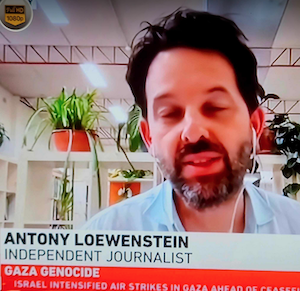
Interviewed by Al Jazeera today after a four-day temporary truce between Israel and Hamas took effect, author Loewenstein described the conflict as “apocalyptic” and the most devastating in almost 80 years since the Second World War.
He also blamed the death and destruction on Western countries that had allowed the Israeli Defence Force (IDF) to “get away with things that no other country could because of total global impunity”.
‘Genocide Joe’
The United States, led by a feeble and increasingly lame duck President Joe Biden – “genocide Joe”, as some US protesters have branded him — and several Western countries have lost credibility over any debate about global human rights.
As Turkish President Recep Tayyip Erdoğan says, the US and the West have enabled the ethnic cleansing and displayed a double standard by condemning Hamas for its atrocities on October 7 while giving Israel a blank cheque for its crimes against humanity and war crimes in both Gaza and the Occupied West Bank.
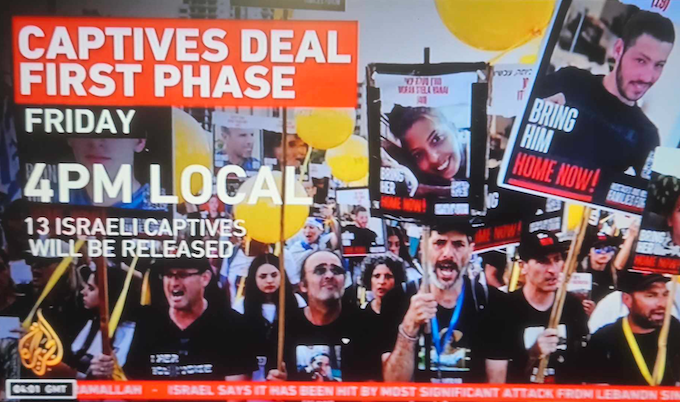
We are relieved to confirm the safe release of 24 hostages.
We have facilitated this release by transporting them from Gaza to the Rafah border, marking the real-life impact of our role as a neutral intermediary between the parties.— ICRC in Israel & OT (@ICRC_ilot) November 24, 2023
In fact, as Erdoğan has increasingly condemned the Zionists, he has branded Israel as a “terror state” and says that Israeli leaders should be tried for war crimes at the International Court of Justice in The Hague.
It has also been disturbing that President Biden has publicly repeated Israeli lies in the conflict and Western media has often disseminated these falsehoods.
Media analysts say there is systemic “bias in favour of Israel” which is “irreparably damaging” the credibility of some news agencies and outlets considered “mainstream” in the eyes of Arabs and others.
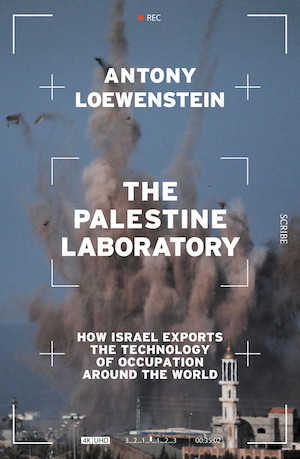 Loewenstein, who was awarded Australia’s 2023 Walkley Award in the journalism book category tonight, warned in The Palestine Laboratory that “an Israeli operation might be undertaken to ensure a mass exodus, with the prospect of Palestinians returning to their homes a remote possibility” (p. 211).
Loewenstein, who was awarded Australia’s 2023 Walkley Award in the journalism book category tonight, warned in The Palestine Laboratory that “an Israeli operation might be undertaken to ensure a mass exodus, with the prospect of Palestinians returning to their homes a remote possibility” (p. 211).
Many critics fear the bottom line for Israel’s war on Palestine, is not just the elimination of Hamas — which was elected the government of Gaza in 2006 — but the destruction of the enclave’s infrastructure, hence the savage assault on 25 of the Strip’s 32 hospitals (including the Indonesian Hospital) and bombing of 49 percent of the housing for 2.3 million people.
Loewenstein reports:
“In a 2016 poll conducted by [the] Pew Research Centre, nearly half of Israeli Jews supported the transfer or expulsion of Arabs. And some 60 percent of Israeli Jews backed complete separation from Arabs, according to a study in 2022 by the Israeli Democracy Institute. The majority of Israeli Jews polled online in 2022 supported the expulsion of people accused of disloyalty to the state, a policy advocated by popular far-right politician Itamar Ben-Gvir” (p. 211).
Dangerous escalation
Loewenstein saw the reelection in November 2022 of Netanyahu as Prime Minister and as head of the most right-wing coalition in the Israel’s history as ushering in a dangerous escalation of existential threats facing Palestinians.
The author, who is himself of Jewish origin, cites liberal Israeli columnist and journalist Gideon Levy in Haaretz reminding his readers of “an uncomfortable truth” after the Russian invasion of Ukraine in February 2022. Levy wrote that the long-held Israeli belief that military power “was all that matters to stay alive , was a lie” (p. 206). Levy wrote”
“The lesson Israel should be learning from Ukraine is the opposite. Military power is not enough, it is impossible to survive alone, we need true international support, which can’t be bought just be developing drones and drop bombs.”
Levy argued that the “age of the Jewish state paralysing the world when it cries “anti-semitism” was coming to a close.
The daily television scenes — especially on Al Jazeera and TRT World News, arguably offering the most balanced, comprehensive and nuanced coverage of the massacres (in contrast to such media as BBC and CNN with journalists embedded with the Israeli Defence Force — have borne witness to the rogue status of Israel.
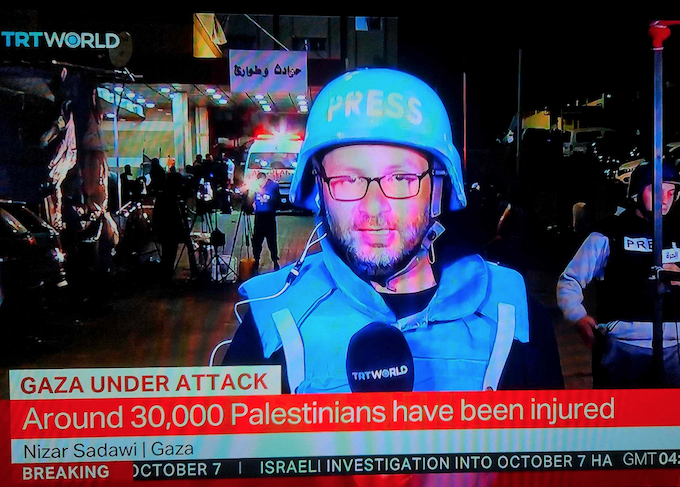
Turkey’s President Erdoğan has been one of the strongest critics of Netanyahu’s war machine, warning that Israel’s leaders will be made accountable for their war crimes.
His condemnation has been paralleled by multiple petitions and actions seeking International Criminal Court (ICC) prosecutions against Israeli leaders, including an arrest warrant for Netanyahu himself.
Toxic ideology
According to Loewenstein, Israel’s “Palestine laboratory” and its toxic ideology thrives on global disruption and violence. As he says:
“The worsening climate crisis will benefit Israel’s defence sector in a future where nation-states do not respond with active measures to reduce the impacts of surging temperatures but instead ghetto-ise themselves, Israeli-style. What this means in practice is higher walls and tighter borders, greater surveillance of refugees, facial recognition, drones, smart fences, and biometric databases (p. 207).”
By 2025, Loewenstein points out, the border surveillance industrial complex is estimated to become worth US$68 billion, and Israeli companies such as Elbeit Systems are “guaranteed to be among the main beneficiaries.”
Three years ago Israel spent $US22 billion on its military and was is 12th biggest military supplier in the world with sales of more than $US345 million.
The potency of Palestine as a laboratory for methods of controlling “unwanted people” and a separation of populations is the primary focus of Loewenstein’s book. The many case studies of Israeli apartheid with corporations showcasing and profiting from the suppression and persecution of Palestinians are featured.
The book is divided into seven chapters, with a conclusion, headed “Selling weapons to anybody who wants them,” “September 11 was good for business,” “Preventing an outbreak of peace,” “Selling Israeli occupation to the world,” “The enduring appeal of Israeli domination,” “Israel mass surveillance in the brain of your phone,” and “Social media companies don’t like Palestinians.”
How Israel has such influence over Silicon Valley — along with many Western governments — is “both obvious and ominous for the future of marginalised groups, because it is not just the Jewish state that has discovered the Achilles heel of big tech”.
‘Real harm’ against minorities
Examples cited by Loewenstein include India under Prime Minister Narendra Modi successfully demanding that Facebook remove posts critical of his government’s handling of the covid pandemic of 2020, and evidence of Facebook posts causing “real harm against minorities” in Myanmar and Russia as well as India and Palestine.
The company’s global policy team argued that they risked having the platform shutdown completely if they did not comply with government requests. Profits before human rights.
Loewenstein refers to social media calls for genocide against the Muslim minority having “moved from the fringes to the mainstream”. Condemning this, Loewenstein remarks: “Leaving these comments up, which routinely happens, is deeply irresponsible” (p. 197).
He argues that his book is a warning that “despotism has never been so easily shareable with compact technology”. He explains:
“The ethnonationalist ideas behind it are appealing to millions of people because democratic leaders have failed to deliver. A Pew Research Centre survey across 34 countries in 2020 found only 44 percent of those polled were content with democracy, while 52 percent were not. Ethnonationalist ideology grows when accountable democracy withers, Israel is the ultimate model and goal” (p. 16).
The September 11, 2001, terror attacks on New York and Washington “turbocharged Israel’s defence sector and internationalised the war on terror that the Jewish state had been fighting for decades” (p. 49).
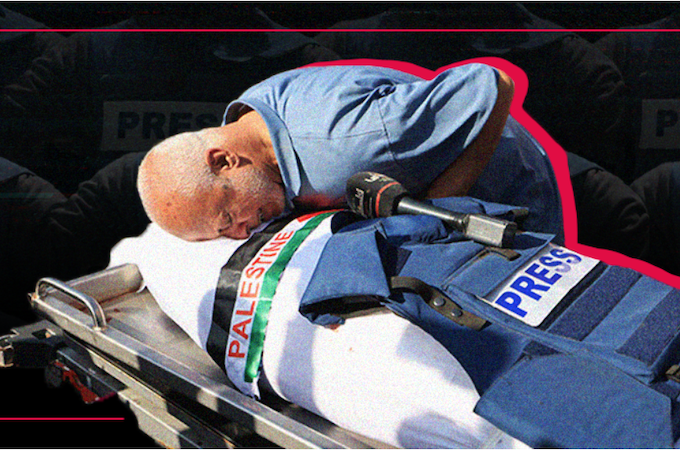
War against journalists
Along with health workers (200 killed and the total climbing), journalists have suffering a heavy price for reporting Israel’s relentless bombardment with at least 48 dead (including media workers in Lebanon, the death toll has topped 60).
The Paris-based media freedom watchdog Reporters without Borders has accused Israel of seeking to “eradicate journalism in Gaza” by refusing to heed calls to protect media workers.
“The situation is dire for Palestinian journalists trapped in the enclave, where ten have been killed in the past three days, bringing the total media death toll in Gaza since the start of the war to 48. The past weekend was the deadliest for the media since the war between Israel and Hamas began.”
RSF also said Gaza from north to south had “become a cemetery for journalists”.
Of the 10 journalists killed between November 18-20, at least three were killed in the course of their work or because of it. They were: Hassouna Sleem, director of the Palestinian online news agency Quds News, and freelance photo-journalist Sary Mansour who were killed during an Israeli assault on the Bureij refugee camp in the central Gaza Strip on November 18.
According to RSF, they had received an online death threat in connection with their work 24 hours prior to them being killed.
Journalist Bilal Jadallah was killed by an Israeli strike that hit his car directly as he was trying to evacuate from Gaza City via the district of Zeitoun on the morning of November 19.
He was a prominent figure within the Palestinian media community and held several positions including chair of the board of Press House-Palestine, an organisation supporting independent media and journalists in Gaza.
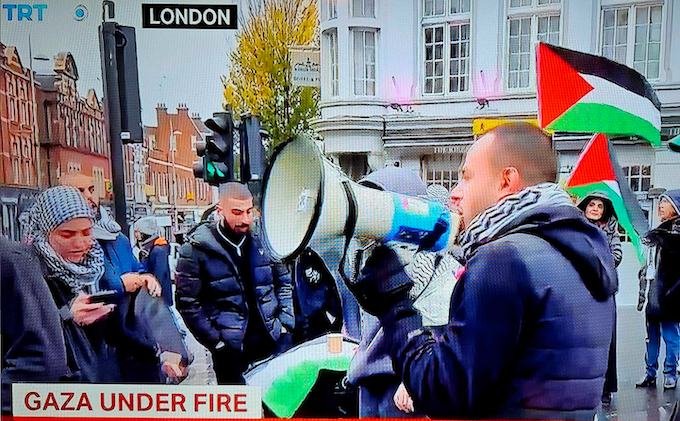
Killed with family members
Most of the journalists were killed with family members when Israeli strikes hit their homes, reports RSF.
It is offensive that British and US news media should refer to Hamas “terrorists” in their news bulletins, regardless of the fact that the US and UK governments have declared them as such.
As a former journalist with British and French news agencies for several years, I wonder what has happened to the maxim that had applied since the post-Second World War anticolonialism struggles — one person’s terrorist is another person’s freedom fighter. Thus “neutral” descriptions were generally used.
As President Erdoğan, has already pointed out, Hamas are nationalists fighting against 75 years of Zionist Israeli colonialism and apartheid. Palestine is the occupied territory; Israel is the illegal occupier.
Loewenstein argues in his book that Israel has sold so much defence equipment and surveillance technologies, such as the phone-hacking tool Pegasus, that it had hoped to “insulate itself” from any political backlash to its endless occupation.
However, the tide has turned with several countries such as South Africa and Turkey closing Israeli embassies and recalling their diplomats and as demonstrated by the UN General Assembly’s overwhelming vote last month for an immediate humanitarian truce.
There is a shift in global opinion in response to the massive price that the Palestinian people have been paying for Israeli apartheid and repression for 75 years. While Iran has long been portrayed by the West as a threat to regional peace, the relentless and ruthless bombardment of the Gaza Strip for seven weeks has demonstrated to the world that Israel is actually the threat.
However, Israel is on the wrong side of history. Whatever it does, the Palestinians will remain defiant and resilient.
Palestine will become a free, sovereign state. It is essential that international community pressure ensures that this happens for a just and lasting peace.
• The Palestine Laboratory: How Israel exports the technology of occupation around the world, by Antony Loewenstein. Scribe Publications, Melbourne, 2023. Reviewer Dr David Robie is editor and publisher of Asia Pacific Report.












































